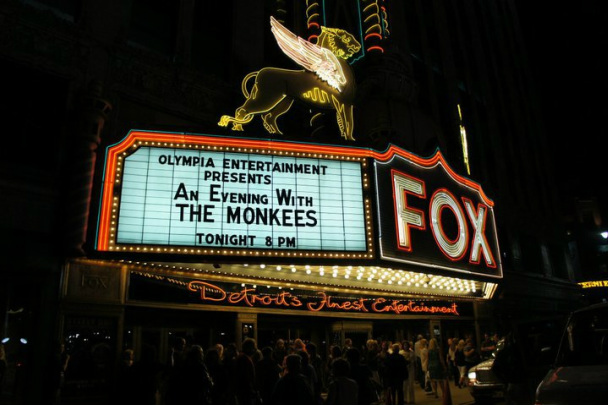![]()
Category: Monkees
AIRCHECK OF THE WEEK W/: STEVE ROBBINS WKNR ’67
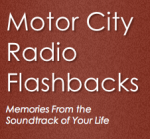 From the MCRFB Aircheck Library: WKNR
From the MCRFB Aircheck Library: WKNR
Steve Robbins on 1310 AM WKNR “Keener 13” 1967
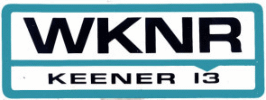 “In Detroit for the first time. You heard their records. You seen them on TV. Now see them in person! The Monkees in person at Olympia Stadium 7:30 Saturday. KEENER presents the MONKEES!” — Paul Cannon, WKNR
“In Detroit for the first time. You heard their records. You seen them on TV. Now see them in person! The Monkees in person at Olympia Stadium 7:30 Saturday. KEENER presents the MONKEES!” — Paul Cannon, WKNR
THE MONKEES ARE COMING! KEENER 13 Brings the Monkees to Olympia, January 14, 1967
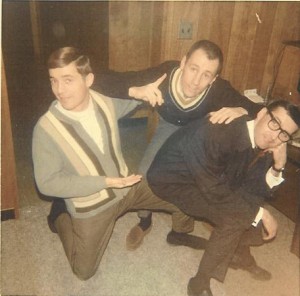
….The Monkees are coming, right?…
On Saturday, January 14, 1967, WKNR “Keener 13,” in conjuction with Dick Clark Productions, sponsored the biggest Detroit concert event since WKNR brought the Beatles to Olympia Stadium on August 13, 1966.
…. No. 1., what a perfect song by the perfect group, the Monkees on Keener 13…
When this classic WKNR aircheck was recorded on Friday, January 13, 1967, you can sense the exuberance and euphoria for the anticipated arrival, then, of the band’s arrival here in the Motor City for the very first time.
There was a “lot of excitement around here,” at the station at the time, said Keener deejay Steve Robbins on his show just twenty-four hours before the Monkees would take to the stage at the Olympia, Saturday night, January 14, 1967. The Olympia Monkees event eventually sold out.
Moving swiftly from city to city across the country, the Monkees 1966-1967 North American Tour was such a success that it was extended further into late-August of that year by popular demand. WKNR would again sponsor the Monkees return back to Detroit at the Olympia once again, this time it was scheduled for Saturday, July 29, 1967.
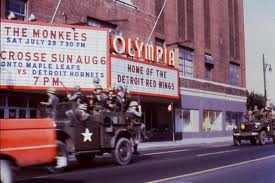
But in the early hours of Sunday, July 23, 1967 Detroit erupted in flames. Due to the civil unrest and local and federal curfews imposed during the riots, the pre-scheduled show was immediately canceled.
Keener deejay J. Michael Wilson issued this WKNR-released statement on Wednesday, July 26 during his 10 PM show:
“Here’s an important announcement regarding the Monkees appearance in Detroit. In case you missed it, the concert at Olympia Stadium scheduled Saturday, July 29 has been postponed. The new date has not been determined at this time. Please hold on to your Monkees tickets. When a new date has been set it will be announced on WKNR. Do not call WKNR or Olympia. Stay tuned to Keener for information regarding the Monkees concert — repeating — the Monkees concert sheduled for July 29 has been postponed. No new date has been set at this point. Hold on to your Monkees tickets and stay tuned to Keener for further information. Do Not call WKNR or Olympia.”

Ultimately, the Detroit-canceled July 29 Monkees concert was rescheduled for Sunday, August 13, 1967 — a year to the day WKNR brought the Beatles back to Olympia in August 1966.
In January of 1967, Keener “fill-in” Steve Robbins was sharing on-air duties on a part-time basis at the WKNR-FM studios, while sharing some air-time there with Keener FM deejay Bob Harper. Just the same, at the time Robbins was still doing his full-time show during the week at WKFR in Battle Creek’s “Keener 14” under the name Steve Clark. When Jim Jeffries left WKNR the latter-part of 1967 for WQXI in Atlanta, Steve left WKFR to become the new overnight deejay on Keener 13.
This week, unexpected news came that Davy Jones, formerly of the Monkees, passed away suddenly at the age of 66 on February 29. But for a just brief moment in time, MCRFB will take you back in 1967 when “Monkeesmania” was widespread and prevalent here in the Motor City and the Monkees and WKNR was at the top at No. 1. “THE MONKEES ARE COMING!”
From the MCRFB Aircheck Library, featuring:
___
WKNR-AM * Steve Robbins * (Monkeesmania!) January 13, 1967
Bob Green talks to Davy Jones of the Monkees, 1967
WKNR-AM * Bob Green * Davey Jones Interview (Monkees) 1967
(Keener deejays 1967 photograph, top, courtesy the Art Vuolo collection)
![]()
A TEENER’S ‘DAYDREAM.’ DAVY JONES REMEMBERED
HIS FIRST PROFESSIONAL ACTING gig happened when he was eleven. He was a star on the BBC’s Coronation Street at age 16. And when he was 20, Davy Jones was picked from a casting call of thousands to be part of a made-for-television rock band that became one of the most popular acts of the decade.
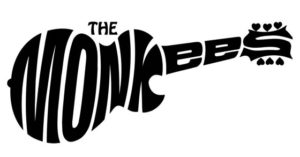 After seeing the film A Hard Day’s Night, Bob Rafelson and Bert Schneider decided to create a TV show that would feature what they hoped would be America’s answer to the Beatles. Their first choice was to sign John Sebastian’s Lovin’ Spoonful, but that group already had a record contract. So they ran an ad in Daily Variety and The Hollywood Reporter in the fall of 1965 to find their musicians.
After seeing the film A Hard Day’s Night, Bob Rafelson and Bert Schneider decided to create a TV show that would feature what they hoped would be America’s answer to the Beatles. Their first choice was to sign John Sebastian’s Lovin’ Spoonful, but that group already had a record contract. So they ran an ad in Daily Variety and The Hollywood Reporter in the fall of 1965 to find their musicians.
Americans Micky Dolenz, Michael Nesmith, and Peter Tork, and Brit Davy Jones were ultimately hired and under the guidance of Don Kirshner, the Monkees were born. The group had help from some of the best writers in the business including Tommy Boyce, Bobby Hart, Neil Diamond and the Brill Building team of Gerry Goffin, Carole King. They charted 13 times on the WKNR Music Guide, with hits like “Last Train to Clarksville“, “I’m A Believer“, “(I’m Not Your) Steppin’ Stone“, “Pleasant Valley Sunday” and “Daydream Believer.” They held down Keener Hit Number One five times.
While each Monkee had his fan base, Davy was a particular favorite. With the British Invasion in full swing, his English accent and Beatle hair cut put him at the forefront. 38 years later, Yahoo Music named him “Number 1 teen idol of all time.”
At the height of the Monkee’s popularity, Davy Jones talked with Bob Green about life in the Hollywood spotlight.
Jones continued to pursue a show business career after the Monkees broke up in 1971, touring with Dolenz, Boyce & Hart and various other side men. His stage and television credits include starring with Dolenz in Harry Nilsson‘s play The Point in London and appearances on, The Brady Bunch, My Two Dads, Here Come the Brides, and Love, American Style. He continued to record, releasing his last album in 2009.
His last performance happened on February 19th in Oklahoma, just ten days before he died in his sleep of a massive heart attack at age 66.
![]()
